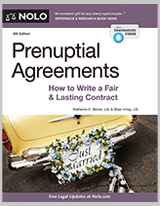Living Together & Marriage
Whether you live together, register as domestic partners, enter a civil union, or marry, there are steps you can take to protect your relationship, property, and children.
These books, written and updated by the Nolo team, contain all the information and forms you need, including living together contracts and prenuptial agreements.
Featured Products
Living Together & Marriage Products by Category
Prenuptial Agreement Books
eForm
Prenuptial Agreement Worksheet Kit
Prenuptial agreements made easy - use this kit to prepare you to meet with your attorney and save big money on their fees.
$17.99
$29.99 40% OFF
$24.49
$34.99 30% OFF
Marriage and Domestic Partnership
eForm
Crisis Kit
Keep essential documents all in one place in case you need to leave home in a hurry.
$0.00
$29.99 100% OFF

